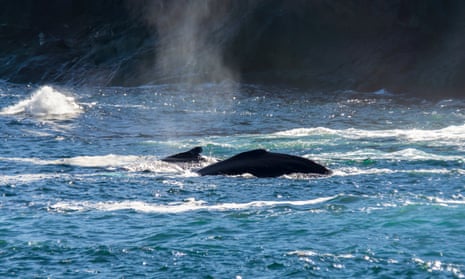Humpback whales could be struggling to breed due to rapid environmental change in the ocean caused by the climate crisis, a study suggests.
Scientists have confirmed a significant decline in the number of calves born to female humpbacks over the past 15 years in the Gulf of St Lawrence, Canada, an important summer feeding ground for migrating whales. They said the climate crisis has led to rapid sea temperature and sea level rise in this area of the north Atlantic, with knock-on effects for the ecosystem that include decreasing numbers of herring, a vital food source for humpback whales.
Researchers from the University of St Andrews sea mammal research unit took samples from the blubber of female humpbacks, to test whether they were pregnant and, by identifying markers on individuals, they determined whether the whales returned with calves.
They related the probability of finding cow-calf pairs to favourable environmental conditions the previous year, measured by herring stock. They found that 39% of the pregnancies were unsuccessful and the annual calving rate dropped significantly from 2004 to 2018.
In a paper published in Global Change Biology, Joanna Kershaw, a researcher of marine mammals from St Andrews and lead author of the study, said: “Together, these data suggest that the declines in reproductive success could be, at least in part, the result of females being unable to accumulate the energy reserves necessary to maintain pregnancy and/or meet the energetic demands of lactation in years of poorer prey availability rather than solely an inability to become pregnant.”
It was previously thought that baleen whales, a group to which humpbacks belong, could potentially show some resistance to climate change, by changing migratory patterns or by switching prey species if the abundance or location of prey species changed. Indeed, officials in Florida have recently reported an “encouraging” number of sightings of critically endangered North Atlantic right whale.
However, the decline in calving rates by the population in the Gulf of Saint Lawrence over a period of major environmental change may suggest a “limited resilience” to such ecosystem change, Kershaw said.
The research follows a study by the University of Queensland, Australia, which predicted declines in baleen whales in the Southern Ocean as a result of reduced prey such as krill and copepods, and increased competition between whale species due to reduced food stocks caused by climate change.
